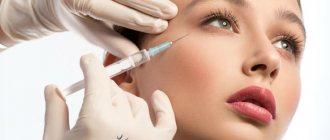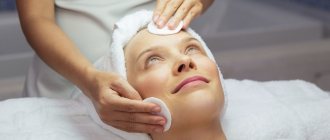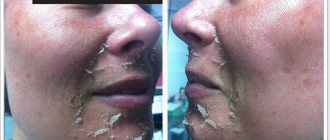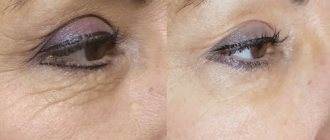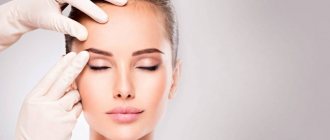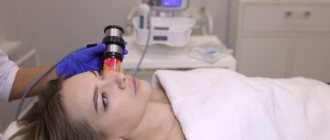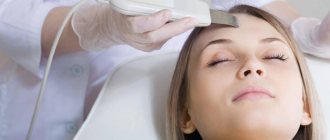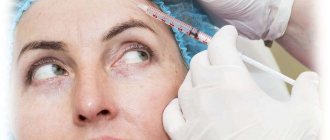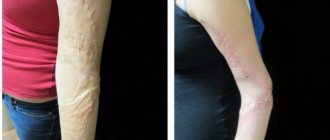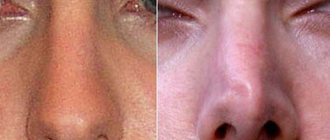It took you so long to decide on mesotherapy (it hurts, after all, you need to prepare), but when the day of the first procedure was just around the corner, you discovered that you were pregnant. Is it possible to do it? Can small injections with vitamins cause harm? They can, so you need to familiarize yourself with the possible risks in advance.
Mesotherapy is a popular cosmetic procedure that solves many aesthetic problems of the face and body. It is considered to be quite harmless. However, contraindications to mesotherapy include pregnancy and breastfeeding.
The essence of the procedure
If you translate the name of mesotherapy, it will roughly sound like “treatment from the middle.” When performing this procedure, specially developed drugs are injected under the skin using a thin needle, laser, or non-injection method. These cocktails may include:
- Hyaluronic acid - moisturizes the skin, replenishes lost soft tissue volumes and stimulates collagen production.
- Multivitamin complexes provide the dermis with all the necessary nutrients and slow down the aging process.
- Fat burning components are substances that destroy fat cells and stimulate metabolic processes.
- Amino acids and peptides are protein compounds that are building materials for cells.
- Immunomodulators – increase the protective properties of the skin, help fight pathogenic microorganisms.
- Antibiotics – these drugs are used to treat acne.
In principle, high-quality cocktails are hypoallergenic and absolutely safe for humans. But during pregnancy, everything changes dramatically. And most cosmetic procedures and drugs are prohibited.
Operating principle
Mesotherapy is the introduction of active cosmetic substances into the deep layers of the skin through micropunctures. There are injection and fractional mesotherapy. Mesoscooters can also be used for procedures.
Typically, meso-cocktails are used - sterile serums with concentrates of water-soluble active ingredients (hyaluronic acid, vitamins, DMAE, el-carnitine, plant extracts, etc.). Sometimes this can be a sterile solution, for example, pure hyaluronic acid.
Injections can only be performed by a cosmetologist in the salon. Using a syringe, the specialist injects the solution into the skin to a strictly defined depth. There are many such injections.
A mesoscooter is the simplest device with which you can carry out procedures similar to salon ones, even at home. The roller is a rotating drum mounted on a handle with many microneedles. The device makes many micro-punctures simultaneously.
Fractional mesotherapy is a procedure using an electronic device. This is the most advanced and modern method. The device allows you to insert needles strictly vertically, to a clearly defined depth, with high frequency and simultaneously. The device can be used in the salon or at home.
With all types of mesotherapy, many microtraumas are caused to the skin. As a result, restoration processes and collagen synthesis are activated. In addition, through the formed channels, the meso-cocktail penetrates deep into the skin. Due to the small diameter of the needles, the punctures close instantly, so no scarring occurs.
❤
Why not
Often women turn to doctors with the question of whether it is possible to do facial mesotherapy during pregnancy and what kind. Doctors believe that you should abstain from the procedure throughout the entire period. Moreover, expectant mothers are always charming in themselves. And here are some completely logical arguments that justify such categoricalness:
- Getting drugs into the blood. Since punctures always damage the capillaries (as evidenced by the “bloody dew” appearing on the skin), some of the drugs enter directly into the bloodstream. This means that it can affect the body of the developing fetus. How this will happen is unknown. So it's better not to take risks.
- Danger of infection . This is especially true if the procedure is performed with a mesoscooter, which is a reusable instrument. But even when working with a conventional syringe or pneumatic gun, there is still the possibility of insufficient treatment of the surface of the skin or hands. Absolute sterility is guaranteed with laser fractional mesotherapy. But pregnancy is a categorical contraindication for this technique.
- Change in pain threshold. A pregnant woman's skin is much more sensitive. And those procedures that she previously tolerated easily become very painful for her. And the use of even local anesthesia is extremely undesirable.
- Psychological factor. It is also of great importance, since ordinary fear of the procedure can provoke: increased blood pressure, uterine hypertonicity, and a sharp hormonal surge. In the early stages, the most negative consequence can be a miscarriage, and in the later stages, premature birth.
In addition, post-traumatic skin pigmentation is a common phenomenon in pregnant women. It can also appear after mesotherapy on the face.
How much does facial mesotherapy cost?
The cost of the procedure is calculated taking into account the severity of the cosmetic defect, the age of the patient, the expected effect, and the type of drug chosen. The cost of a mesotherapy session ranges from 3,000 to 5,000 rubles. But to achieve the most positive result, you will need to undergo a course of therapy consisting of 10 - 12 sessions.
You can check prices and make an appointment with a cosmetologist at the International Hemostasis Clinic by calling the number or filling out the feedback form so that our administrators can contact you, clarify the details and answer all your questions.
Botulinum therapy
Biorevitalization
PRP therapy
Features of different periods
The harm that mesotherapy can cause varies at different stages of pregnancy. It’s not for nothing that it is divided into trimesters. Each period has its own characteristics that affect the outcome and consequences of the procedure. Here's what experts say about it.
First
Recently, family planning has been widely promoted. And it’s not in vain. Often a woman finds out that she is carrying a child under her heart in the second or even third month of pregnancy. And until this moment he continues to lead his usual lifestyle. Including visiting a cosmetologist, performing hardware and injection procedures.
Mesotherapy is very dangerous during early pregnancy, because the fetus is not yet protected by the placental barrier, which filters toxins and substances harmful to it. And in the first trimester, the formation of all vital organs and systems occurs. Some components of mesotherapy cocktails can provoke congenital diseases.
Second
The smoothest and calmest period of pregnancy. Toxicosis usually passes by this time, the baby’s bloodstream is separated from the mother’s by the placenta, therefore, if necessary, at this time it is even allowed to take previously prohibited medications.
For medical reasons, oxygen mesotherapy sessions can be carried out with great caution from the fourth month. This should only be done by a specialist. Performing any procedures on your own at home is categorically unacceptable.
Third
In principle, starting from the seventh month, the baby is already viable. But every additional day in the mother's womb allows it to develop and get stronger. This is why it is so important to prevent premature birth. And they can be provoked by many factors, some of which are also present in a mesotherapy session:
- severe stress - may occur due to fear of the procedure;
- hormonal surge - when fear or excitement is produced, adrenaline is produced;
- high blood pressure - it is provoked by drugs with caffeine used in anti-cellulite therapy.
An infection that gets into the blood can also negatively affect the course of pregnancy and the condition of the fetus. And this can happen after the procedure if the formed crusts are accidentally or intentionally torn off.
Contraindications
It is prohibited to perform anti-aging injections if there are such contraindications (except for pregnancy and lactation):
- Skin diseases;
- Nephropathy;
- Malignant pathology;
- Hypertension;
- Heart diseases;
- Hemophilia.
It is also prohibited to carry out mesotherapy in case of individual intolerance to the components of the cocktail, chronic infections during the period of exacerbation and a tendency to form scars. Injections should be used with caution in areas of the skin where there are moles.
Categorical prohibition
You should not even think about performing mesotherapy during pregnancy in the following cases:
- with severe toxicosis, the body’s reaction to the administration of drugs can be unpredictable;
- if there is a threat of miscarriage and the tone of the uterus is increased;
- women over 35 years of age – they have more natural risk factors.
Under no circumstances should home portable electrical appliances be used to perform needle-free mesotherapy. Their use is prohibited throughout pregnancy.
Carrying out
Before the procedure, you should not treat your scalp with ointment or cream. It is enough to wash your hair with shampoo. Mesotherapy is a fairly simple method, but it is better to entrust the administration of drugs to an experienced specialist. The cosmetologist pre-treats the scalp with an anti-inflammatory and disinfectant. The needle is inserted manually or using a special device. The specialist determines in advance at which points the injection will be performed. The needle is inserted 3-4 mm deep into the skin, so damage to large vessels is unlikely.
The injection method of administering substances is accompanied by minor pain. If a woman cannot tolerate the discomfort, local anesthesia can be used first. The duration of the procedure varies from 30 to 45 minutes. After therapy, the woman can immediately go home.
The basic principle of mesotherapy is the constant administration of small amounts of substances, so a woman may need several sessions to achieve the best effect. Thus, treatment of diffuse alopecia may require 10-15 visits to a cosmetologist. Some procedures are carried out for 7-10 days daily.
Summing up
According to the reviews of most women on the forums of expectant mothers, there is objectively no need for hardware or injection cosmetic procedures while carrying a baby. Yes, acne or pigmentation characteristic of an “interesting situation” may appear on the face, but they quickly disappear after childbirth.
Mesotherapy during pregnancy can do more harm than good and is an additional risk factor. Therefore, it is better to refuse it. If there is an urgent need to improve the condition of facial skin, before oxygen therapy you must consult with the supervising gynecologist and obtain permission from him to carry out the procedure.
An alternative method of solving the problem is massage and masks prepared according to folk recipes. They will help quickly improve your complexion, restore skin firmness and elasticity, tighten and even lighten it. And at the same time, such procedures are completely safe for the expectant mother and baby. And it is better to carry out more intensive therapy after childbirth or the end of the lactation period.
Risks for the expectant mother
Hormonal changes that occur on the very verge of an endocrine disorder greatly change the reaction of a woman’s body to many previously completely harmless factors. That is why during this period of life, women are very carefully prescribed any medications, drinks, even some foods. This also affects mesotherapy, which is based on the direct introduction of medicinal and biologically active substances directly into the skin tissue. The following main risks to a woman’s health and the results of the procedure can be identified:
- Unexpected allergic reactions as a result of hormonal changes in the body. As you know, in some cases, due to the increased activity of certain hormones, a pregnant woman's tastes change, sometimes quite dramatically. In a similar way, the immune system’s “tastes” may change, which will begin to perceive previously harmless substances as strong allergens. It is possible that some of these substances may be part of meso-cocktails.
- Increased likelihood of infectious complications. During mesotherapy, the integrity of the skin is disrupted, which creates an entrance gate for microbes. During pregnancy, the immune system not only “changes tastes”, but also weakens, so it often cannot stop the infection. Thorough treatment of the skin before the procedure does not greatly help the situation - the risk of infection remains the entire time until the injection marks heal.
- Unexpected reaction to the procedure. In addition to the complications described above, a number of other situations are possible due to the instability of the body during pregnancy. These include abnormal dilation of blood vessels with the development of erythema, and the appearance of hypertrophic and keloid scars at the injection site and much more.
It is precisely because carrying out such a procedure during pregnancy carries such significant risks for the health of the expectant mother that it is better not to do mesotherapy. You can limit yourself to using creams or lotions - in some cases, reactions can develop to them, but the degree of their manifestation will be much lower, since there is no penetration of the irritant into the tissues.
After therapy
To maintain the results of mesotherapy, certain rules must be followed. First of all, these are hygienic recommendations that can be obtained from a specialist after the administration of substances. The scalp should be kept clean to reduce the risk of complications. In addition, it is necessary to choose a safe shampoo that does not irritate the scalp.
Basic recommendations:
- For two days after therapy, it is necessary to protect the scalp from excessive exposure to the sun. To do this, it is recommended to wear a hat.
- Temporary refusal of medical and cosmetic procedures. It is especially important not to expose the scalp after injection to peeling agents and topical preparations.
- You can wet your head only 8-10 hours after the procedure. This time is necessary for the healing of the integumentary tissues and the distribution of the injected substances in the dermis. Some experts do not recommend washing your hair for 72 hours after injections.
- Protecting the scalp from the cold. In winter, you must wear a scarf and a hat.
Compliance with these recommendations will help maintain the effect of therapy.
